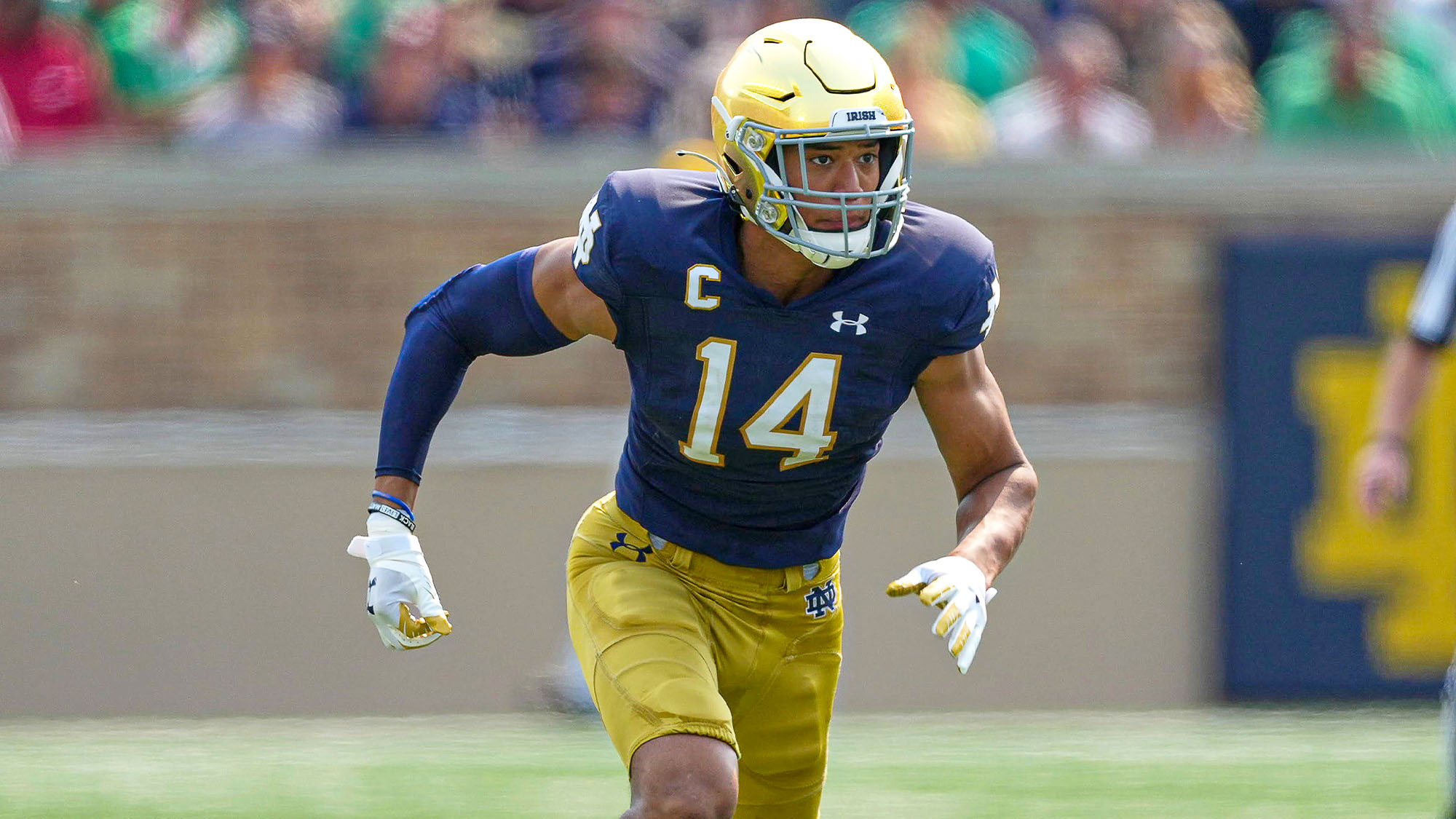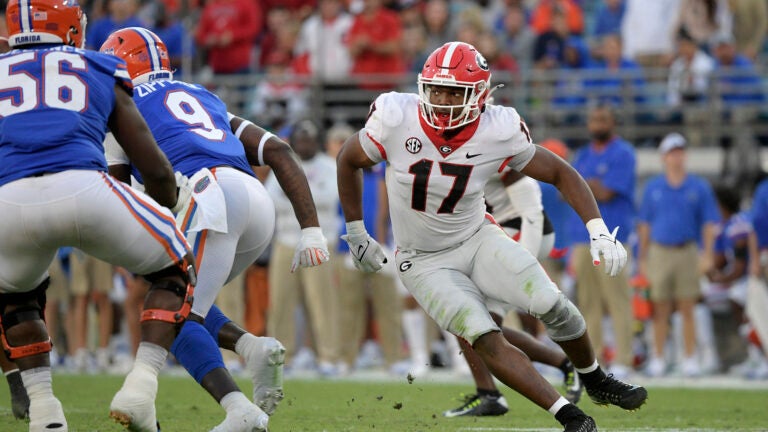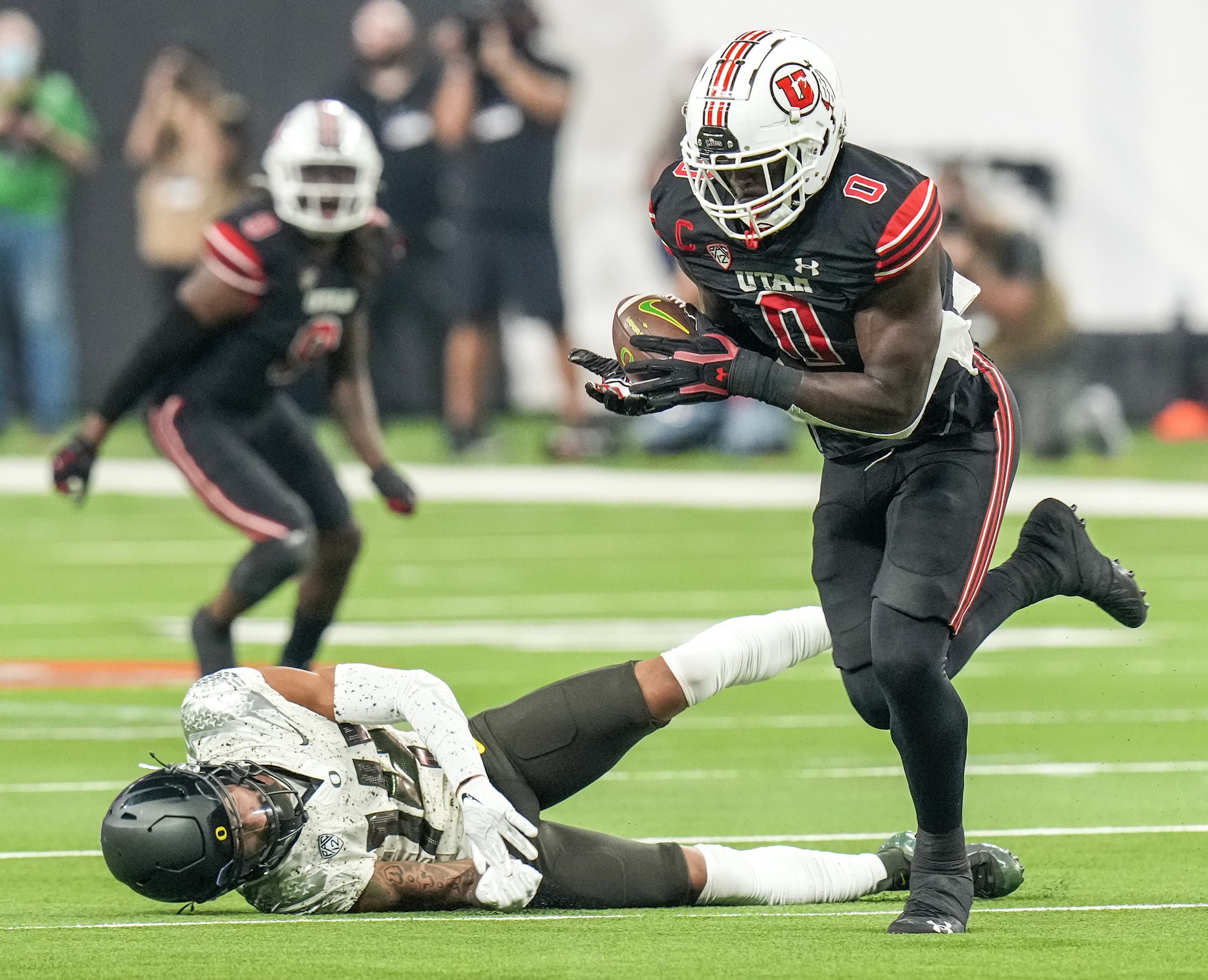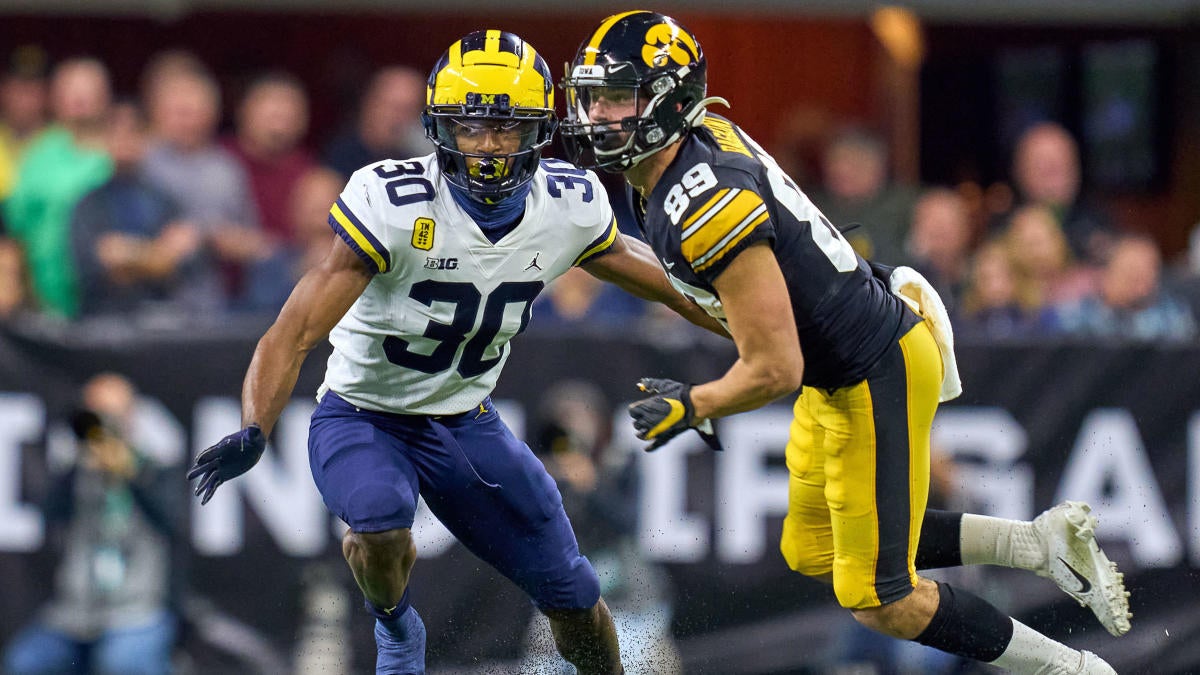This is the group I call “linebackers and safeties”, but it’s pretty much just where I stick “miscellaneous defenders”. These positions aren’t as valuable as cornerbacks or defensive linemen, but special talents in these roles can make a huge difference (unlike, say, running backs). There are first-round caliber players at these positions. They’re just a bit scarcer than at other positions.
Kyle Hamilton, S, Notre Dame

Hamilton is an interesting prospect where we have to have two different conversations, one about him as a player and one about value. The first conversation is a lot simpler though, so I’ll start with that.
Hamilton is one of the most impressive safeties I’ve ever scouted on the field. From the start he stands out, 6-4 and 220 pounds with arms that seem to hang down to his knees. He uses every inch of this frame as well, with tremendous ball skills that produce regular deflections and interceptions. When he’s around the ball, good things happen, and he’s around the ball a lot thanks to his greatest asset, his intelligence. Several times each game it seems like Hamilton is hanging out in the offensive huddle, as he beats an opposing receiver to the endpoint of his route.
Hamilton is extremely good at what he does. But that raises the two key questions: how much does he do, and how valuable is that? Safety is kind of a gray area for positional value, because it encompasses so many things. At the top are safeties who can do it all, players like Tyrann Mathieu and Harrison Smith that can bounce around at any point on the defense and make an impact. They can lock up a receiver in man coverage, they can terrorize a quarterback as a blitzer, they can erase a deep chunk of the field. They can be whatever a defensive coordinator wants them to be.
Hamilton is not that. He’s a useful player in run support, with the same instincts he brings to coverage and good skill as a tackler, even if he occasionally will take a horrendous angle that gives him no chance. He maneuvers through traffic well but struggles some with physicality, and I wouldn’t want him to spend too much time close to the line. He’s functional enough in man coverage to handle tight ends, but he’ll be in trouble if asked to match up in the slot against wide receivers who will have the quickness to break him down with their routes.
This brings up the real problem with Hamilton. He is not as athletic as he looks on the field. When he’s in pads he seems to fly everywhere at all times, arriving a step faster than you would expect someone of his size to move. But this comes back to his instincts, which allow him to leave a step sooner than most ordinary players.
This distinction may not seem like a big deal, but it does limit his versatility some in the NFL. A great safety has to be both proactive and reactive, and I worry that Hamilton doesn’t have the pure athleticism necessary to excel as a reactor. That means he may be confined to a role as a pure deep safety, away from the line where he can read the play in front of him and use his greatest strengths. This isn’t a bad thing, and it’s a role that is more valuable now than at any other point in history. It might be enough to make me hesitate to take him in the top ten, but after that I’d be comfortable that I was grabbing a real difference maker on defense, provided I use him right.
Nakobe Dean, LB, Georgia

Dean is another player who supplements good athleticism with exceptional football intelligence. His first step is almost always in the correct direction, and once he starts moving he has the ability to accelerate to top speed in a hurry and cover ground from sideline to sideline. He makes plays that most other linebackers can’t even dream of because he’s so quick to react and so explosive as an athlete, and he’s the sort of player who jumps off the screen several times each game. At times he can play a little out of control as a tackler, but for the most part he understands how to properly utilize his athleticism without overusing it.
This intelligence translates to pass coverage as well, which is the strongest point of Dean’s game. He still has some work to do in coverage, as do all young linebackers, but he is far ahead of most college defenders I’ve seen. His hits his marks perfectly on his drops into zone coverage, adjusting in anticipation of opposing routes to take away an opposing receiver before he can even come open. At times in man coverage he can get a little too eager to jump routes, but his recovery speed is usually enough to cover up these lapses. If he continues to develop, he’ll be a real asset in pass coverage in the NFL.
I have more concerns about his abilities as a run defender. Dean is on the small side for a linebacker, and it shows up some when he is forced to play in traffic. At Georgia he had a superstar defensive front that kept him clean on almost every play, a luxury he won’t have in the NFL where he will regularly have to deal with blockers coming downhill at him. He does have some intriguing ability to bend around blockers that he seems to show off only as a blitzer. If he can add this to his toolset as a run defender, he has the ability to become one of the best linebackers in the game.
As
he is now, I do feel like he’ll likely be a bit limited. Put him behind a
couple of defensive tackles who can control blockers, and he can be a star. But
if you’re leaning on him as the focal point of your defense, it will leave a
vulnerability for teams with good running games to pound the ball right at him. That's a tough sell for most defenses, but for a team with a good plan and supporting cast I think his upside still makes him worth a pick at the very end of the first round.
Devin Lloyd, LB, Utah

This is where we have to have another conversation about value. Linebacker as a position has historically been geared towards stopping the run game, and even today that is mostly the case, if only because of a dearth of linebackers who excel in pass defense. So when you have to choose between a linebacker who excels against the pass and is weak against the run versus one who is good against the run but has some struggles against the pass, it’s an ongoing conversation. There is a well-established role for the latter kind of linebacker, as a two-down player who leaves the field in passing situations. It might be harder to get the former player onto the field at all, but if he can make it work there the potential value is significantly higher.
This isn’t to say that Lloyd is absolute garbage as a pass defender, or that he is a superstar against the run. He’s just a bit more balanced than Dean, which is why some people have him ranked higher. He has more size and significantly more play strength, which shows up with his ability to engage blockers and shed them to make plays in the running game. He doesn’t quite have Dean’s long speed, but his first couple steps are right there with him, giving him the ability to shoot through gaps and close to make impressive plays. He’s a bit rough around the edges in this part of his game, sometimes moving forward too quickly and cutting himself off from the play, sometimes shooting too fast and missing tackles. But I feel confident that he will develop into a stellar run defender in the NFL.
I’m less confident about his abilities in pass coverage. He makes some good plays there, which may bode well for his development in this area, but he also has moments where he seems completely lost and brings nothing of value. At times in college he was moved down to defensive end in passing situations so he didn’t even have to bother in coverage, which may give thoughts of a Micah Parsons-like role, even if he never showed any actual pass rushing ability. There is something to work with here, but young linebackers don’t always develop in coverage as you’d expect. And if he doesn’t develop in this part of the game, it’s hard to justify grabbing a two-down linebacker in the first round.
Daxton Hill, S/CB, Michigan

Hill is tough to evaluate because I’m not sure the role he played in college is the one he’ll end up in at the NFL level. At Michigan he was primarily used as a slot cornerback, a role that has an interesting value in the NFL. Players who can do it at a serviceable level are pretty easy to find and don’t add that much to a defense, while players who are elite are extremely rare and extremely valuable. If it’s someone like Mathieu, who can lock down in coverage and make a major impact as a run defender, that is absolutely worth a first-round pick. But if it’s just another cornerback who only covers routes out of the slot, it can easily be found in free agency or in a later-round selection.
Purely evaluating Hill as a slot cornerback, he’s closer to the latter than a former. He is very good in coverage, with the strength to disrupt players off the line, the speed to track them down the field, and the quickness to keep up with routes that break in front of him. There are some rough patches in his game—he sometimes plays off balance, and his small frame is a problem at the catch point—but I expect if he sticks with this in the NFL he will be a quality third cornerback.
The problem is that he brings very little to the table in run support. He wasn’t asked to do a lot of this at Michigan, so it’s possible he can develop more in the NFL, but even the little I saw raised questions about how much success he’ll have. He gets pushed around by any blocker he comes in contact with, and he’s a poor tackler, either whiffing or getting dragged for several yards after contact.
If Hill is just a slot cornerback, he’s probably not worth more than a third-round pick. But he is a sensational athlete with high football intelligence, and I think he could transition to a more valuable role in the NFL. His speed and anticipation would make him valuable in a defense that wants to play him in a deep zone, with the extra flexibility to rotate down and play man-to-man in the slot in passing situations. His lack of physicality still bothers me there, and the fact that I haven’t seen him actually play this position makes it hard to justify a big investment. But the upside probably makes him worth a second round selection.
No comments:
Post a Comment